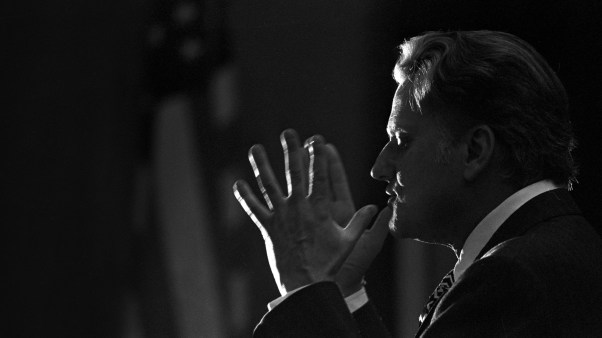Four hundred eighty one years ago this week, in 1521, a young Martin Luther was called before Holy Roman Emperor Charles V at the Diet of Worms (“diet” meaning a formal meeting, not a weight-loss plan, and Worms being a city south of Frankfurt). Luther thought he would have a chance to defend his ideas. Charles would only accept an ironclad recantation. What Charles got was Luther’s defiant “Here I Stand” speech—or did he?
Scott H. Hendrix, author of Luther and the Papacy: Stages in a Reformation Conflict (Fortress, 1981), investigated this question for Christian History issue 34: Luther’s Early Years. Hendrix notes that Luther caused such a sensation that all sorts of tales about him circulated, sometimes traveling faster than reliable facts. The speech story apparently received some quick touch-up treatment. Hendrix writes:
“In April 1521, Luther appeared before Emperor Charles V to defend what he had taught and written. At the end of his speech, the story goes, he spoke the famous words, ‘Here I stand; I can do no other. God help me.’
“The earliest printed version of Luther’s address added these words, which were not recorded on the spot. It’s possible they are genuine, but for almost a half-century now, most scholars have believed they were probably not spoken by Luther.
“A second misunderstanding arises when the words ‘Here I stand’ are quoted as evidence of Luther’s modern stand against the medieval powers of church and empire. Luther’s speech was not a defiant, solitary protest, but a calm, reasoned account of why he had written the books piled on the table before him and why he could not recant their content.
“Luther asserted that his conscience was captive to the Word of God and that he could not go against conscience. This was not, however, a modern plea for the supremacy of the individual conscience or for religious freedom. Though already excommunicated by Rome, Luther saw himself as a sworn teacher of Scripture who must advocate the right of all Christians to hear and live by the gospel.”
Without “Here I stand,” is Luther’s shining moment forever dulled, like the March on Washington without “I have a dream” or the Gettysburg Address without “Four score and seven years”? Hardly. In his seminal Luther: Man Between God and the Devil (English edition Yale, 1989), Reformation scholar Heiko Oberman renders Luther’s speech like this:
Unless I am convinced by the testimony of the Holy Scriptures or by evident reason—for I can believe neither pope nor councils alone, as it is clear that they have erred repeatedly and contradicted themselves—I consider myself convicted by the testimony of Holy Scripture, which is my basis; my conscience is captive to the Word of God. Thus I cannot and will not recant, because acting against one’s conscience is neither safe nor sound. God help me. Amen.
Whoever first printed that speech and added the famous phrase apparently wanted very much to stand by it. Luther could hardly have minded.
Elesha Coffman is managing editor of Christian History magazine.
Copyright © 2002 Christianity Today. Click for reprint information.
Related Elsewhere
More Christian History, including a list of events that occurred this week in the church’s past, is available at ChristianHistory.net. Subscriptions to the quarterly print magazine are also available.
Christian History Corner appears every Friday at ChristianityToday.com. Previous editions include:
National Makeover | Washington’s struggle to sell the American image overseas illustrates how sharply today’s reality differs from seventeenth-century ideals. (Apr. 5, 2002)
Easter Eloquence | The holiday has inspired great words from some of history’s greatest preachers. (March 28, 2002)
The Other Holy Day | In the rush toward Good Friday and Easter, don’t forget Maundy Thursday. (March 22, 2002)
The Politics of Patrick | In the field of Irish history, every turn of phrase hints at the author’s spin. (March 15, 2002)
Don’t Touch That Dial | Could a bitter debate among religious broadcasters really cause a “full-scale split in evangelicalism”? (Mar. 8, 2002)
Translation Wars | Sharp as debate over the TNIV may be, the version’s translators are getting off easy compared to John Wycliffe and William Tyndale. (March 1, 2002)
The Cremation Question | Firm belief in resurrection hasn’t kept Christians from caring-and arguing-about what happens to the bodies of the dead. (Feb. 22, 2002)
Citius, Altius, Sanctus | The modern Olympics, though hardly Christian, hail from an era when athleticism was next to godliness. (Feb. 15, 2002)
Alternative Religions | Many non- and semi-Christian groups laid claim to the West, but none more successfully than the Mormons. (Feb. 8, 2002)
Zion Haste | Does the passion of a few nineteenth-century Chicagoans still influence American policy in the Middle East? (Feb. 2, 2002)
Final Solution, Part II | The Nazis planned to obliterate Christianity, too, according to newly published Nuremberg documents. (Jan. 25, 2002)
Tell Me a Story | The most helpful church history scholarship is both broad and narrative. (Jan. 18, 2002)








